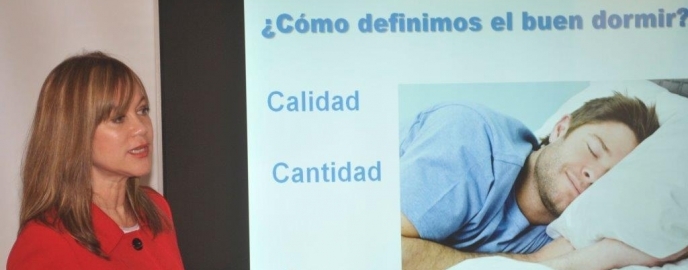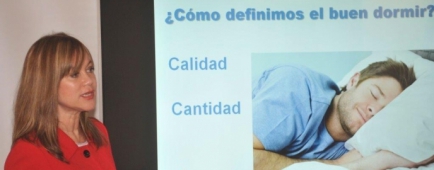MEDIO DE PUBLICACIÓN
Diario EL PAIS 13.08.16
El Hospital
Prensa
Dormir bien para vivir mejor

Disfrutar de un sueño saludable es una necesidad fisiológica fundamental del ser humano y un objetivo alcanzable si observamos algunos hábitos que lo hacen posible y nos permitirán obtener una mejor calidad de vida. Es por ello que, bajo el lema “Dormir es un sueño alcanzable”, el Hospital Británico organizó un taller liderado por la doctora Cecilia Orellana, especialista en Medicina del Sueño, que debido a la excelente respuesta de los socios tendrá una segunda edición el próximo jueves 1º de setiembre. “El sueño saludable es una necesidad fisiológica del ser humano”, apuntó Orellana y agregó que “nuestra vida actual dificulta muchas veces que podamos cumplir con ella”. La especialista, que integra el Laboratorio del Sueño del Hospital Británico y es neuróloga y neurofisióloga clínica, sostuvo que “dormir bien implica tener una buena calidad de sueño, entendiendo por tal al sueño reparador”. Para definir el sueño reparador Orellana señaló que “a la mañana siguiente debemos sentirnos descansados, bien despiertos y con la sensación de haber dormido suficiente y adecuadamente en la noche”. La duración “es igualmente importante, un adulto sano debe dormir de 7 a 8 horas continuas durante la noche”. La calidad, la duración y la oportunidad, conforman las principales variables para obtener un sueño saludable. “Las buenas condiciones para dormir, entendiendo por tales un ambiente adecuado, silencioso, cómodo y seguro, son otro elemento importante a tener en cuenta”, añadió. Así, sentirnos descansados al día siguiente “es lo que marca la calidad de nuestro sueño”, graficó Orellana. “Dormir bien es un sueño alcanzable refiere al lema para este año de la Asociación Mundial del Sueño y también es una forma de marcar que debe ser una meta en nuestras vidas y que es una meta alcanzable”, explicó. La especialista dijo que existen varios tips o consejos para alcanzar la meta de dormir y hacerlo bien, como observar horarios regulares y mantener rutinas previas al sueño adecuadas, disminuyendo o evitando estímulos audiovisuales excesivos. La Medicina del Sueño detectó y describió 65 patologías del sueño distintas. Entre el 40 y el 50% de la población mundial está afectada por algún trastorno del sueño, que puede ser transitorio o crónico. Orellana subrayó el aporte de la tecnología, en las últimas décadas y en ése sentido, pues permitió a la ciencia avanzar en “el conocimiento de lo que pasa durante el sueño, lo que sucede en nuestro cerebro y en nuestro cuerpo mientras dormimos”. Apuntó que el insomnio es una de las patologías del sueño más prevalente pero recordó que puede ser un trastorno transitorio, por lo que convocó a consultar al médico precozmente para poder superarlo, así como sus consecuencias, sin recurrir a la automedicación. Asimismo, los trastornos respiratorios durante el sueño, especialmente el Síndrome de Apneas, presente en pacientes que roncan, detienen su respiración y presentan sobrepreso, merecen un diagnóstico y tratamiento adecuado, concluyó.

